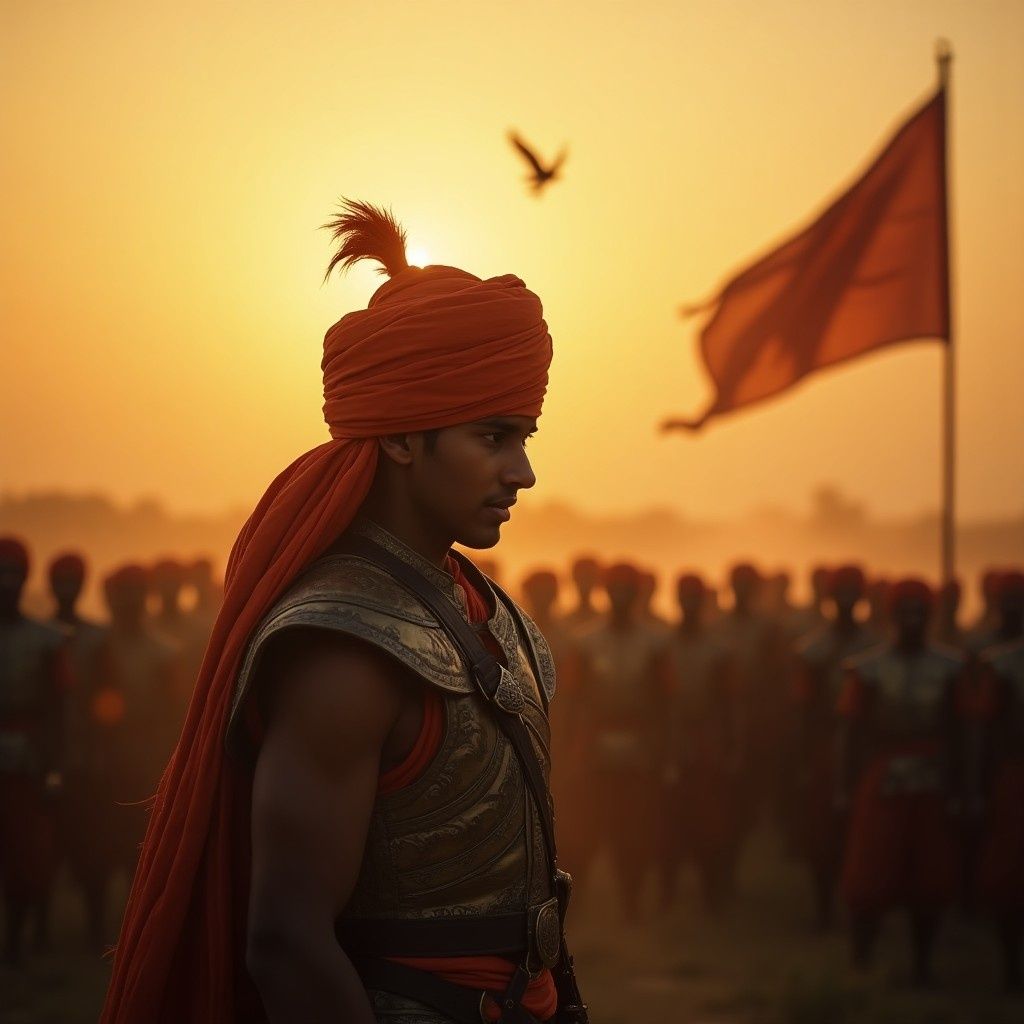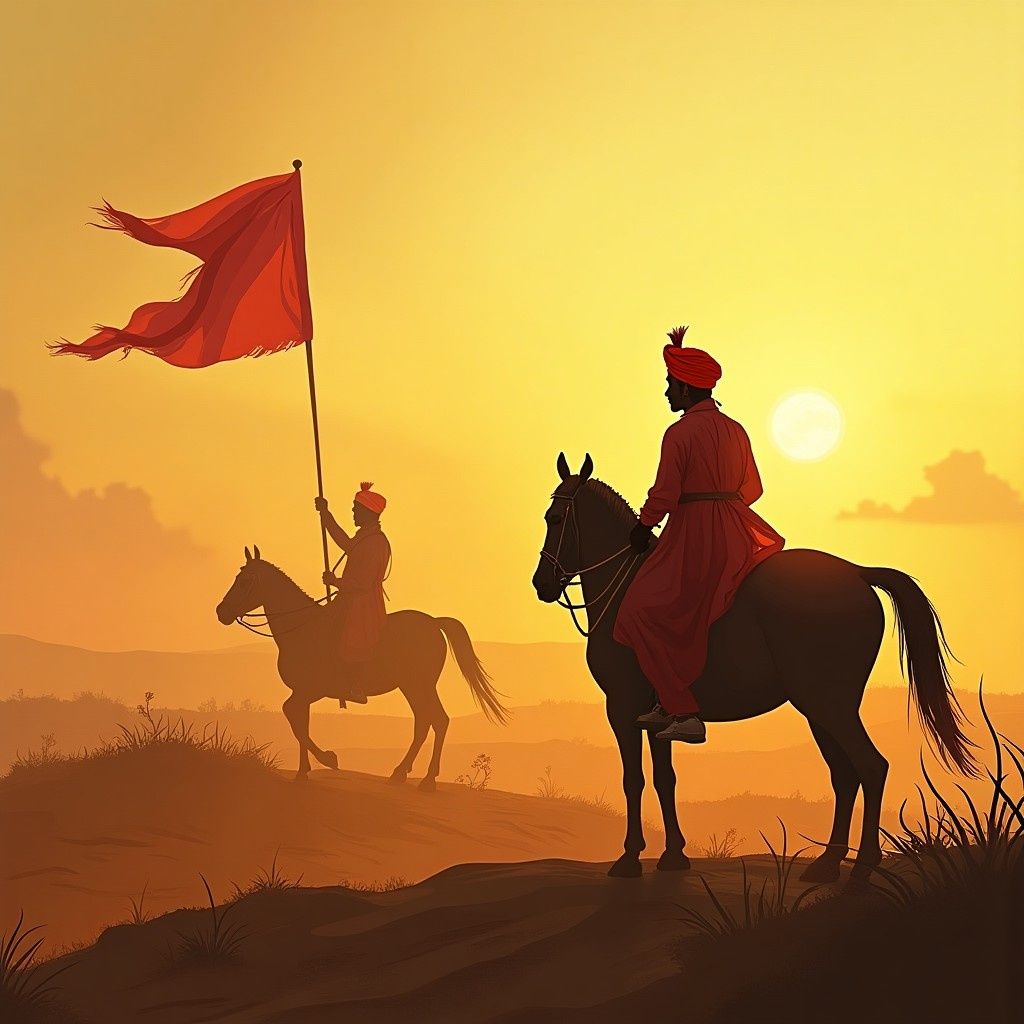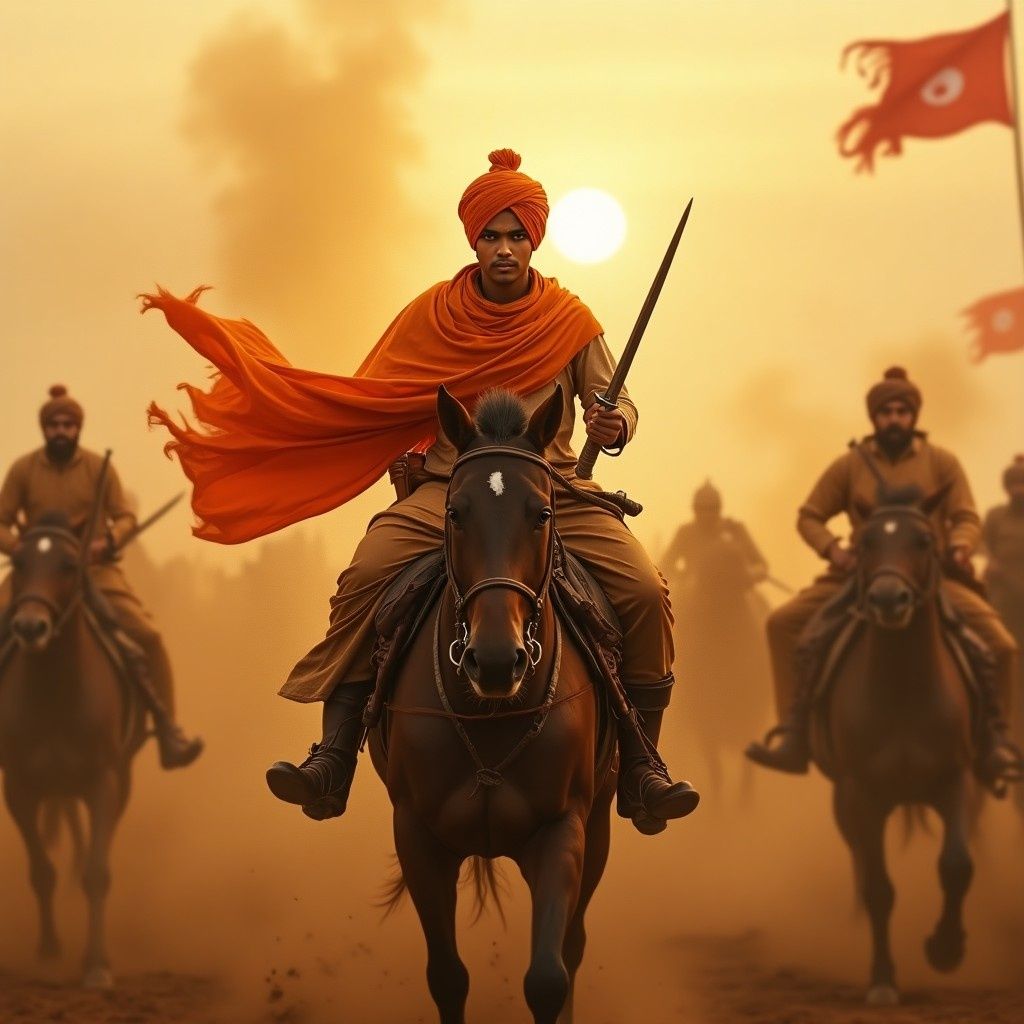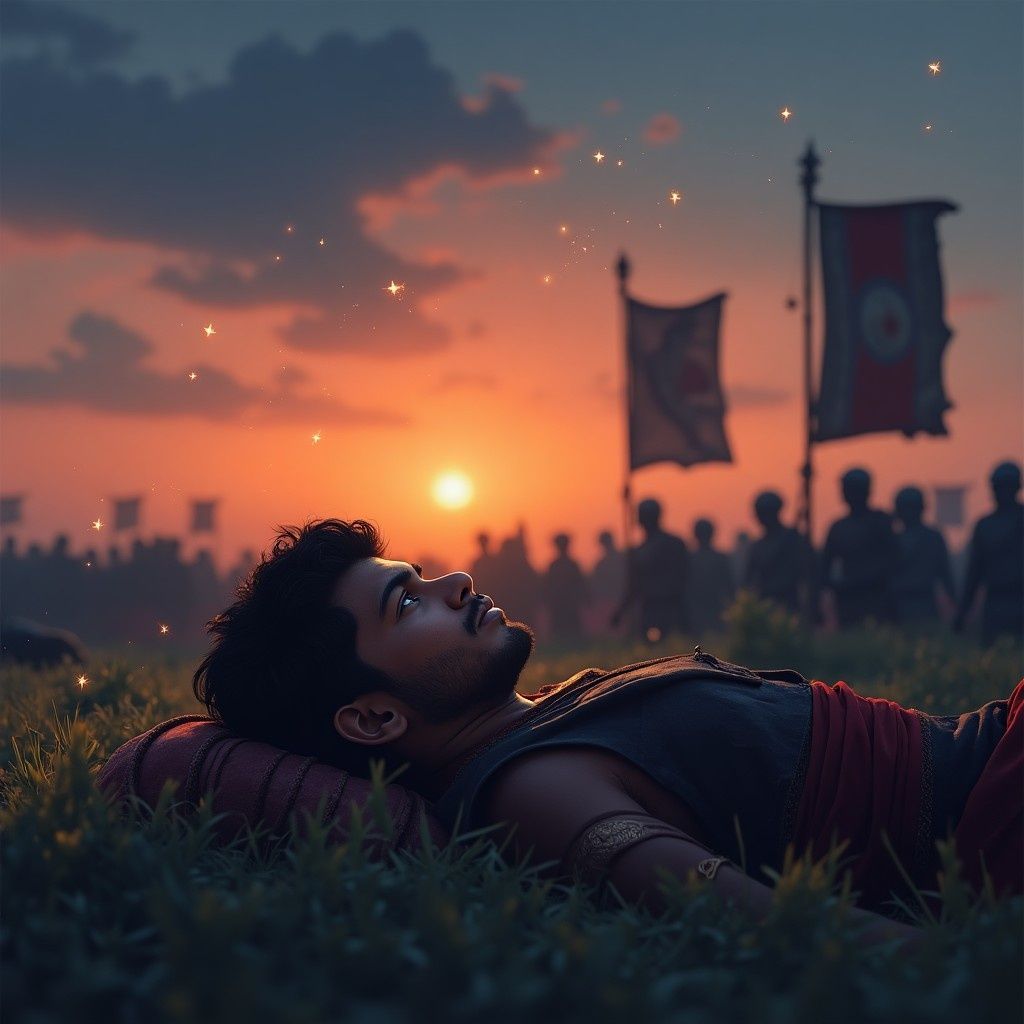**Whispers of Panipat**
The morning sun cast a pallid glow over the vast plains of Panipat, a silent witness to the gathering storm of men and metal. Among the throng of Maratha soldiers, a young warrior named Arjun adjusted his turban, the vibrant saffron a stark contrast to the dusty battlefield. His heart pounded with a mixture of fear and fervor, a tumultuous rhythm that echoed the drums of war.

Arjun had left his village months ago, drawn by the tales of glory and honor promised by the Maratha Confederacy. His father, a veteran of many skirmishes, had reluctantly given his blessing, his eyes clouded with memories of battles past. "Remember, Arjun," he had said, "the true fight is not for land or power, but for the soul of our people." As the armies prepared for the clash, Arjun's gaze fell upon Sadashivrao Bhau, the commander of the Maratha forces. Bhau stood tall, his presence a beacon of hope amidst the encroaching dread. His voice, when it rose above the din, was a clarion call to arms, urging his men to stand firm against the invaders.

Across the field, the Durrani Empire's banners fluttered like ominous birds of prey. Ahmad Shah Abdali, the Afghan king, was a formidable adversary, his coalition of Afghan forces and Indian allies a testament to his cunning and influence. The air was thick with anticipation, the ground trembling under the weight of impending conflict. As the battle commenced, the Marathas surged forward with the ferocity of a monsoon storm. Arjun fought with the fervor of a man possessed, his sword a blur of steel and sweat. Around him, the cries of the wounded mingled with the clash of weapons, a cacophony of chaos and courage. For a moment, it seemed as though the Marathas might turn the tide. Their cavalry charged with unparalleled vigor, slicing through the enemy ranks like a hot knife through butter. But then, the Afghan artillery roared to life, its deadly precision shattering the Maratha lines.

Amidst the turmoil, Arjun found himself face to face with an Afghan soldier, their eyes locking in a moment of shared humanity before the dance of death resumed. As their blades clashed, Arjun's mind flickered to his father's words, the weight of his legacy pressing upon him. The day wore on, the sun a relentless sentinel in the sky. The Marathas, despite their valor, were gradually overwhelmed by the strategic prowess of Abdali's forces. The ground was littered with the fallen, their dreams of glory extinguished in the dust of Panipat. As the sun dipped below the horizon, casting long shadows over the battlefield, Arjun lay amidst the remnants of the Maratha army. His body was battered, his spirit bruised, yet a flicker of defiance remained in his eyes. The defeat was a bitter pill, a temporary eclipse of their power, but Arjun knew that the spirit of his people would endure. In the quiet aftermath, as the night cloaked the land in darkness, Arjun whispered a silent vow to the stars. The battle was lost, but the fight for their soul, for their future, would continue. The whispers of Panipat would echo through the ages, a testament to the indomitable spirit of those who dared to dream of a brighter dawn.


Arjun had left his village months ago, drawn by the tales of glory and honor promised by the Maratha Confederacy. His father, a veteran of many skirmishes, had reluctantly given his blessing, his eyes clouded with memories of battles past. "Remember, Arjun," he had said, "the true fight is not for land or power, but for the soul of our people." As the armies prepared for the clash, Arjun's gaze fell upon Sadashivrao Bhau, the commander of the Maratha forces. Bhau stood tall, his presence a beacon of hope amidst the encroaching dread. His voice, when it rose above the din, was a clarion call to arms, urging his men to stand firm against the invaders.

Across the field, the Durrani Empire's banners fluttered like ominous birds of prey. Ahmad Shah Abdali, the Afghan king, was a formidable adversary, his coalition of Afghan forces and Indian allies a testament to his cunning and influence. The air was thick with anticipation, the ground trembling under the weight of impending conflict. As the battle commenced, the Marathas surged forward with the ferocity of a monsoon storm. Arjun fought with the fervor of a man possessed, his sword a blur of steel and sweat. Around him, the cries of the wounded mingled with the clash of weapons, a cacophony of chaos and courage. For a moment, it seemed as though the Marathas might turn the tide. Their cavalry charged with unparalleled vigor, slicing through the enemy ranks like a hot knife through butter. But then, the Afghan artillery roared to life, its deadly precision shattering the Maratha lines.

Amidst the turmoil, Arjun found himself face to face with an Afghan soldier, their eyes locking in a moment of shared humanity before the dance of death resumed. As their blades clashed, Arjun's mind flickered to his father's words, the weight of his legacy pressing upon him. The day wore on, the sun a relentless sentinel in the sky. The Marathas, despite their valor, were gradually overwhelmed by the strategic prowess of Abdali's forces. The ground was littered with the fallen, their dreams of glory extinguished in the dust of Panipat. As the sun dipped below the horizon, casting long shadows over the battlefield, Arjun lay amidst the remnants of the Maratha army. His body was battered, his spirit bruised, yet a flicker of defiance remained in his eyes. The defeat was a bitter pill, a temporary eclipse of their power, but Arjun knew that the spirit of his people would endure. In the quiet aftermath, as the night cloaked the land in darkness, Arjun whispered a silent vow to the stars. The battle was lost, but the fight for their soul, for their future, would continue. The whispers of Panipat would echo through the ages, a testament to the indomitable spirit of those who dared to dream of a brighter dawn.

The Third Battle of Panipat, fought on January 14, 1761, was a significant conflict between the Maratha Confederacy and the Durrani Empire led by Ahmad Shah Abdali. Taking place near Panipat, north of Delhi, this battle involved over 125,000 troops and resulted in one of the largest single-day fatalities in 18th-century warfare. The Marathas, led by Sadashivrao Bhau, faced a coalition of Afghan forces and Indian allies, including the Rohillas and Shuja-ud-Daula of Oudh. Despite their initial successes, the Marathas were ultimately defeated due to strategic missteps and the effective use of Afghan artillery and cavalry. This defeat halted Maratha expansion in northern India and marked a temporary decline in their power, although they managed to regain some influence in the following decade.


Comments
Post a Comment